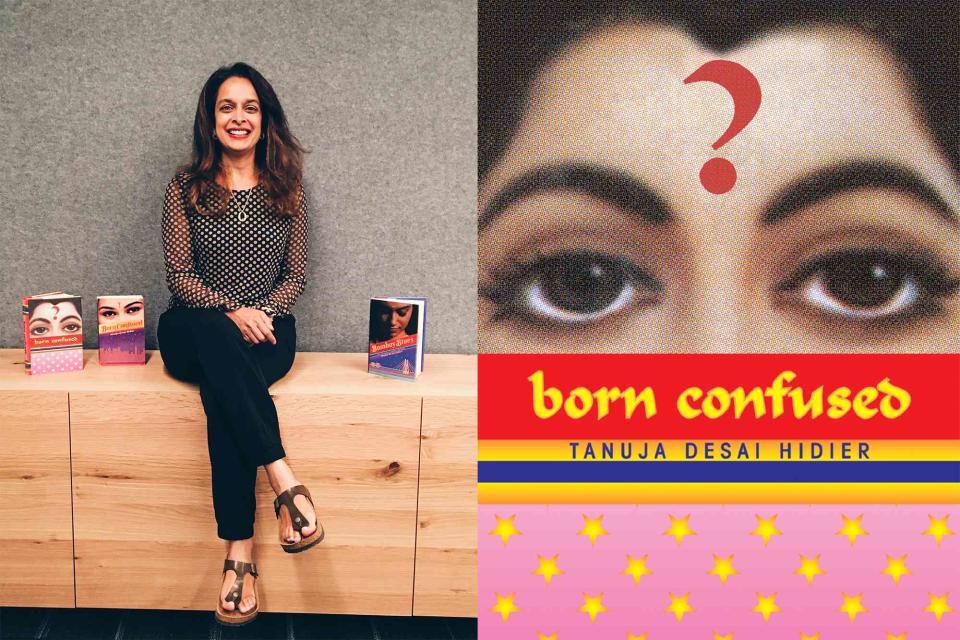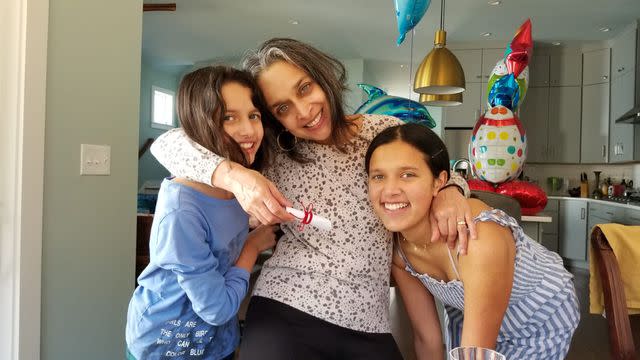As an Author, I Created The Representative Books I Needed As a Teen
- Oops!Something went wrong.Please try again later.
On the 20th anniversary of her book 'Born Confused,' author Tanuja Desai Hidier writes about creating characters that reflect her life—and how that representation inspired her daughters.

Tanuja Desai Hidier / Scholastic
Dimple Lala, my on-page daughter and doppleganger—the Indian-American teen protagonist of my first book Born Confused and its sequel Bombay Blues—turns 20 this month. As with children growing up, an epic blink of an eye.
I was not yet a mother when I wrote Born Confused (though it did take nine months to write and revise—or my whole life up until that point), but I was hoping to mother the supposed “other”: the box we ticked on American questionnaires when I was growing up, the way so many of us hyphenated-identity humans were, and are, viewed.
My pioneering parents were the first from both sides of the family to immigrate to the United States. They’d broken ground prior, too—upon falling in Bollywood-love in med school in India, my apartheid-South Africa-born Gujarati father and Bombay-born Maharashtrian mother had an out-of-caste love marriage, and at a time their two states were at war.
Their open-mindedness would be a boon for my brother and me. Turning borders to bridges: in their blood. Making space: their shared story. Out-of-bounds love leading the unpaved way.
Once in the US, my parents didn’t see or speak to their phoneless families for six years. It was the 60s: no technology to stay in touch—a cultural and personal isolation hard to imagine today. Contact with the motherland was via triple-fold airmail stationery letters that took weeks, sometimes months, to arrive, turning our mailbox azure with that distant longed-for sky.
At that time, no people of our particular diasporic background were visible, audible anywhere—not on our streets, TV, in bands, magazines, on bookshelves. Nor even in my imagination.
Years later, I’d reenvision that neither-here-nor-there space as the We Are Here of Born Confused. Decades-old memories resurfaced in the process: my father, eating khichdi kadhi with his hands, switching abruptly to the cutlery my mother would whisk his way in a silent diaspora dance of shame were someone to appear at the door. My being deemed the color of dog poo at recess. Three neighborhood moms called a meeting with my mother and me…to accuse me of witchcraft. (They’d spotted me mumbling spells on our street-in-progress and claimed their cats were vanishing as a consequence.)
Likely, I was just making up stories on that dirt hill. Was this under-the-breath word-and-world-building in fact a kind of witchcraft? And how the frock had that felt for my mother? Being construed as “other.” Even villainous. Undeserving of dignity, inclusion, in the story. However, my parents made sure I was included, too.
"Don’t think or say negative things about yourself," my mother instructed. "They come out your mouth, go back in your ear, worm into your mind, and brainwash you."
"You are the apple of my eye," my father would sing to me, exuberantly off-key. "We’re proud of you. We see you. Believe in you."
That I was whole and worthy of taking up space in this world—and not only that, but loved—was never in question for them (by me later? yes).
Related: 11 Recently Banned Books—And What That Means for Our Kids
Teaching Me My Story Matters

Tanuja Desai Hidier
My parents created a home that naturally blended our worlds. My mother singing “Rupa Tera,” segueing into Prince. Christmas tree near kitchen Krishna temple. Mango pulp (from three-hour-drive-away Indian grocer) residing beside alphabet soup.
Art and stories were valued in this sanctuary, too. My parents opted, with their limited budget, to first buy a piano for my brother and me, imbue the living room with music—before furnishing it. Our bookshelves bloomed Encyclopedia Britannicas to Encyclopedia Brown. Indian myths and histories. Judy Blume, JRR Tolkien. Nancy Drew mysteries—my parents’ love, if not exact cultural representation, palpable in this offering.
One birthday, they ordered a custom-made book for me, “Tina” (my nickname), typed in for the protagonist in the story template. When I was 11-ish, they hired someone to type up my handwritten 100-page stories on a Smith-Corona, had them Xeroxed, bound. Same with my poems. And they gifted me a Cricket Magazine subscription, encouraging me to enter the poetry contests (where I was first published—joy!).
They literally inserted me into the narrative—as the protagonist. They placed my own words on the prized bookshelf and informed me in no uncertain terms that the world should hear them.
And they taught me the best witchcraft: the wizardry of words. How to cast a spell on yourself. Convince yourself you not only belong—but deserve to flourish.
“When you speak of your dreams, replace all ‘ifs’ with whens.” My mother.
“Let your writing be your dharma.” My father. “Your desire, your duty.”
Later, within a wonderful Writers Voice workshop community in New York, at last, I began to write Brown characters into my short stories. A breakthrough followed by a block: I didn’t feel Indian enough to write the Indian part of the story, nor American enough to write the American (a few years later, this would become Dimple’s story).
Through these years of self-doubt: “Find excuses to do things, not to not do them.” My father.
"If a clock thinks how many times it must tick in a day, it will be too exhausted to begin." My mother. "So it counts one second at a time. Start with one word."
Did I even have a story to tell? Would I be able to tell it?
"Yes, and yes, and yes!"
What if nobody was listening? Waiting for it?
"We’re listening. We’re waiting."
A world without windows and mirrors can be a tricky one to find words for. My parents opened a portal, showed me my story matters on and off the page. By listening and hearing. By being the first believers in my own dreams; first readers on everything. By loving.
Passing the Lessons on to My Kids

Tanuja Desai Hidier
When my daughters were little, I started a Story of the Day bedtime tradition. We’d begin on the bottom step and bump our bums backwards up the stairs, pausing on each to share a favorite moment.
At the top, every time: "This is my favoritest part of the day," I’d tell them. Hearing their—and sharing our—stories.
An oral tradition of love I was gifted by my own parents, and that I’m doing my best to continue with them, ensuring they know they’re part of the story—and can tell it, too.
The elder of these London-born Indo-Franco-Belgo-Americano dikrees (try that, Starbucks!) is now the same age as Dimple in Born Confused; the younger just became a teen. And the books gracing their shelves? Frocking fantastic! Today’s literary landscape is so different from what it was for me and Dimple—wonderfully. Far more windows and mirrors—though we still need to bring down the walls, behind the scenes, too.
What’s it like to grow up with this? I glimpse that widened world of words with my children, both avid readers and writers. My 17-year-old's first YA novel launched in August. Three of the four characters are women of color; the sole South Asian character makes a brief appearance at the end. My 13-year-old wrote a full-length fantasy novel over the last year, too, featuring tree-creature girls.
I’m thrilled they feel free to write about their cultures. Or not. Interestingly, their characters are all “othered” in some way, people in the margins they write to the center. Where we belong.
Our stories teach us that. And you don’t have to be a writer to have a story, be a parent to be nurturer. This space may be forged in friendship, found family, community; it takes a village. A “we.” To mother the other. Till we see how truly we’re in it together.
Our stories: We can make them, shape them. They live in us, and in each other. They interweave our generations, our elders and children, our communities. Keep them, us breathing. Believing. That we can be heroes.
More than 20 years ago, I began the story of Dimple Lala to choose my own heroes. Honor my family. Celebrate these communities. To have us be seen, and for readers to feel seen, loved, and proud of who they are, in all the messiness that being a hyphenated identity human—or, just human—involves.
This my family, born and found, showed me, told me, until I began to believe it: Your story matters. We’re listening.
It’s the message I keep beaming toward my daughters: We’re proud of you. We see you. Believe in you.
And I hope that’s the embrace readers find and feel through Dimple Lala’s tale, too: You matter. You are loved.
That’s our story, and I’m sticking to it.
Related: Age-by-Age Guide to Reading to Your Baby
For more Parents news, make sure to sign up for our newsletter!
Read the original article on Parents.

